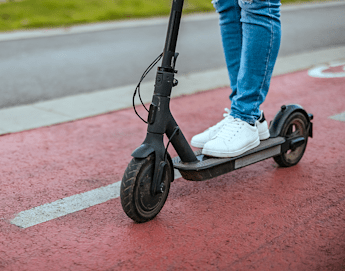The issue of unlicensed e-scooters has raised its head again in the press recently since the lack of regulation around owning an e-scooter has made it easier for riders to commit crimes undetected.
Despite privately owned e-scooters still being banned from public roads and pavements, they are easy to buy and owners do not need to register their ‘vehicles’ as, say, an owner of a moped would.
Considering that the maximum speed of an e-scooter can be modified to travel significantly in excess of the intended 15.5mph limit (some modifications can increase maximum speed to as much as 70mph), this increasingly seems a strange and dangerous anomaly.
Rentable e-scooters that are part of government backed schemes around the UK are capped at 15.5mph and are under the oversight of the local authority. Meanwhile, there are an estimated 750,000 privately owned e-scooters in use illegally around the UK that basically fall under the radar of any current legal or safety legislation.
Now, figures obtained by journalists via Freedom of Information requests appear to show that illegal e-scooters were involved in more than 20,000 crimes logged by the police over three years, including drug deals and robberies, roughly a 60 per cent increase in the number of such offences committed by e-scooter riders. Because there is no record of the e-scooter, the riders acting illegally are more difficult to trace.
Pressure is therefore mounting on the Government to introduce a scheme whereby e-scooter owners must license them with the DVLA, to effectively treat them like mopeds.
The Government reportedly intends to introduce legislation for micromobility vehicles and create a new Low-speed Zero Emission Vehicle (LZEV) category. This is understood to cover both rental and privately owned e-scooters. However, this is subject to when parliamentary time allows, meaning the proposed legislation is currently in limbo. Such legislation cannot come soon enough.
This latest press report coincides with one of my personal injury claims involving an e-scooter rider seriously hurt after they were hit by a car. While establishing liability against negligent drivers should still follow, since it is a matter of the standard of driving, it could be that in certain circumstances, an e-scooter rider being unlicensed could cause complicating legal issues following injury on the roads.
Clearly the same is true where an illegal e-scooter rider injures another road user, there is no safety net of insurance to fall back on and the rider could be personally liable for any damage or injuries they cause while riding their scooter illegally, unless the Motor Insurers' Bureau agree to meet the claim. This is clearly not a long-term solution of justice and compensation arising from such incidents.
According to a Government spokesperson, the trial of government backed e-scooter schemes has been extended to May 2026 ‘to allow us to gather further evidence to ensure that any future legislation balances safety, user accountability and market growth’.

